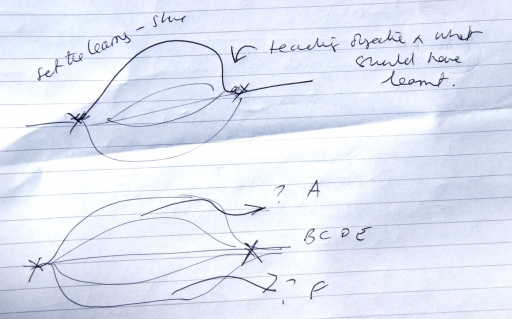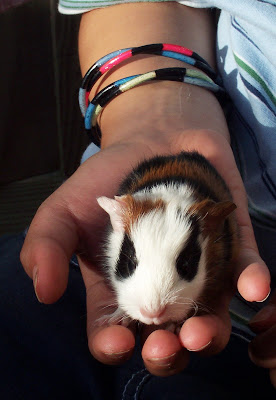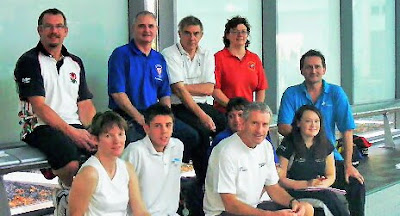Report of the NSF Task Force on Cyberlearning
A great deal has happened in the first six months of 2011, so reading a report published in 2008 already feels as if there are hints at what could be.
It is intriguing that projections for 2015 read like what is happening in 2011.
The rate of change can be so rapid, technologies and services leapfrogging each other all the time.
(Selective parts as indicated rather than all 49 pages. Initially download and the intro printed off. Then downloaded to an iPad and opened an iBook. The versatility here is to skip through unnecessary pages without a thought, and to pull up text in a way that gives it both tactile and visual emphasis, like crumbing flour and sugar to make bread. Suddenly reading takes on the digitation (as in a finger-like action, rather than digitisation) of cooking.
If you haven't read this my suggestion would be - don't bother! Better to read all 33 pages of the extraordinarily insightful and precise US 2011 Horizon Report.
Published in 2008 this NSF Report admits that it is based not on the latest thinking (2008), but on reading publications which by there very nature are likely to be a couple more years old. i.e. in such a fluid, fast-changing environment go for something reasoably current, if not a live-feed or discussion. My preference is to be drawn into expert discussions in various Linkedin Discussions.
My Notes
· Learning is as accessible through technologies at home as it is in the classroom
· Cyberlearning, the use of networked computing and communications technologies to support learning.
· The educational system must respond dynamically to prepare our population for the complex, evolving, global challenges of the 21st century.
· Web technologies enable people to share, access, publish – and learn from – online content and software, across the globe.
· The global scope of networked educational materials, combined with recommendation engine software, helps individuals find special niche content that appeals to their needs and interests.
· Mobile computing not just with laptop computers but also with cellular phones, internet-telephony, videoconferencing, screen sharing, remote collaboration technologies, and immersive graphical environments make distributed collaboration and interaction much richer and more realistic.
EIGHT core strategies to promote the growth of Cyberlearning effectively
1
2
3
4
5
6
7
8
These are mentioned in the introduction, but in the course of my reading they failed to materialise. Perhaps someone can enlighten me.
Similarly, in the introduction we are enticed by the prospect of ‘SEVEN special opportunities for action that have the greatest short-term payoff and long-term promise among the many that NSF might pursue’. I couldn’t find these either.
1
2
3
4
5
6
7
FIVE recommendations that cut across the strategies for growth and opportunities for action detailed in the body of the report.
Here I had more joy as the points are spelt out and bulleted:
1. Cross-disciplinary
2. Interoperable
3. Transformative power
4. Promote open education resources
5. To flourish beyond the funding of a grant
Opening Paragraph
Well-meaning and ambitious, as if written to convince the likes of the Gates Foundation for funding. Just as the US repeatedly saves the planet in block buster movies, here they go again with the evangelical zeal of their founding father.
‘To address the global problems of war and peace, economics, poverty, health and the environment, we need a world citizenry with ready access to knowledge about science, technology, engineering, and mathematics (STEM); social behavioural, and economic sciences, and the humanities.
Our primary, secondary, and higher educational system in the United States today lack the capacity to serve the full populace effectively, not to mention support the lifelong learning essential for coping with our rapidly evolving world. While technology cannot solve all the world’s educational challenges and crises. It has the potential to broaden educational opportunities, improve public understanding and strengthen learning in classrooms and beyond.
· Internet has matured
· High-performance computing and advanced networking are ubiquitous
· Have cell phones
· Becoming a viable educational platform
‘New innovations will continue to be introduced over the coming decade and continually reconfigure the realm of possibilities for learning in a networked world'.
Cyber-enabled learning for the future (Ainsworth et al, 2005)
Cyber from Norbert Wiener (1948)
‘We can now interact at a distance, accessing complex and useful resources in ways unimaginable in early eras.’ 11
YOU NEED THIS DIAGRAM, I WILL IN DUE COURSE DO A SCREEN GRAB AND ADD IT HERE
I always go for concentric rings, ripples from a pool, the rings and satellites of Saturn’s or planets in the Solar System as indicative metaphors for ‘spheres of influence’.
CF Figure 1. Advances in communication and information resources for human interaction (Roy & Jillian Wallis)
As Lord Putnam in the H800 Wk21-22 course notes is quotes as comparing advances made in surgery compared to teaching
‘Few of the innovations tried over the ensuing 25 years have resulted in large-scale change in education. Despite the revolution wrought by technology in medicine, engineering, communications, and many other fields, the classrooms, textbooks, and lectures of today are little different than those of our parents’. (And grandparents?) 12
‘K to grey’ p7 or ‘K to gray’ p12 ?
I will spot the single typo in a book that runs to 400 pages. Here I spot an inconsistency in what will no doubt become as clichéd as ‘24/7’ or ‘cradle to grave’ as a catch-all indicator/desire for life-long learning.
‘Grey’ is a proper noun, as I Lord Grey, Lady Jane Grey, even the Grey Ghost, though of course it might be the gray Grey Ghost, and once she’d had her head cut-off Lady Jane Grey would have turned gray.
Radical change is rarely instantaneous
‘Value is shifting from products to solutions to experiences’ (Prahalad & Krishnan, 2008. P.24)
Cyberlearning offers opportunities to be on the frontier of technical, social, learning, and policy research, information technology has the potential to close knowledge gaps as new digital divides appear with each wave of technical innovation. The challenge is to create a dynamically evolving system to support the learning requirements of 21st century society, work, and citizenship – from K-12 to higher education and beyond to lifelong learning (Rising Above the Gathering Storm. Energizing and Employing America for a Brighter Economic Future, 2007).
My opinion is that there is considerable wishful thinking here given the number of disenfranchised/marginalised groups in western populations both rural and urban, by culture/background, let alone millions fighting to find drinking water and food each day. If the forces that spread education globally train for now more teachers to go out into the field, all well and good, but I don’t see aid agencies handing out smartphones in the refugee camps of Somalia, Ethiopia and Kenya.
BACKGROUND
Why is this such a propitious time for a cyberlearning initiative?
· Quantity, variety and quality of content
· Constant beta releases
· Open, interoperable and global publishing for anyone of anything
· Open Learn
· Creative Commons
· The Long Tail marketplace … purchasing niche items below the popularity curve (or at either ends of it).
· A different ecosystem of learning materials is evolving
‘Advances in computer graphics, interactive visualisation, and immersive technologies now provide verisimilitude to the physical world, a window on unseen processes, and support for hypothetical explorations.’ P17
3.4 Target new audiences pp.27-28
· Materials used in unanticipated ways
· Should be deliberately made for multipurpose uses
· Adapt, mix, mash up.
· Engage users at inception
· Context awareness and content adaptability (Pea and Maldonado, 2006)
GalaxyZoo
· July 2007, 100,000 took part. December 2007 a Dutch teacher made a discovery.
· Also that moth and Spotify
4.3 Harness the deluge of learning data pp 43-44
Imagine this is 2015. Our teacher has quantitative and qualitative data about their students. This is happening with the Khan Academy 2011 and has been running for a couple of years.
· Not so sure about brain imagine and physiological factors
· Spend valuable practice time where it is required.
6 Summary and Recommendations
1. Develop a vibrant Cyberlearning field by promoting cross-disciplinary communities of Cyberlearning researches and practitioners.
2. Instil a platform perspective into NSF Cyberlearning activities
(I disagree. This is not a religion. There is no need to build a church and invite people to attend and take part).
3. Emphasize the Transformative Power of ICT learning. From K to Gray. Synergistic relationships with Foundations: Gates, Hewlett, Kauffman, MacArthur, Mellon)
4. Promote OER
5. Sustain innovations



